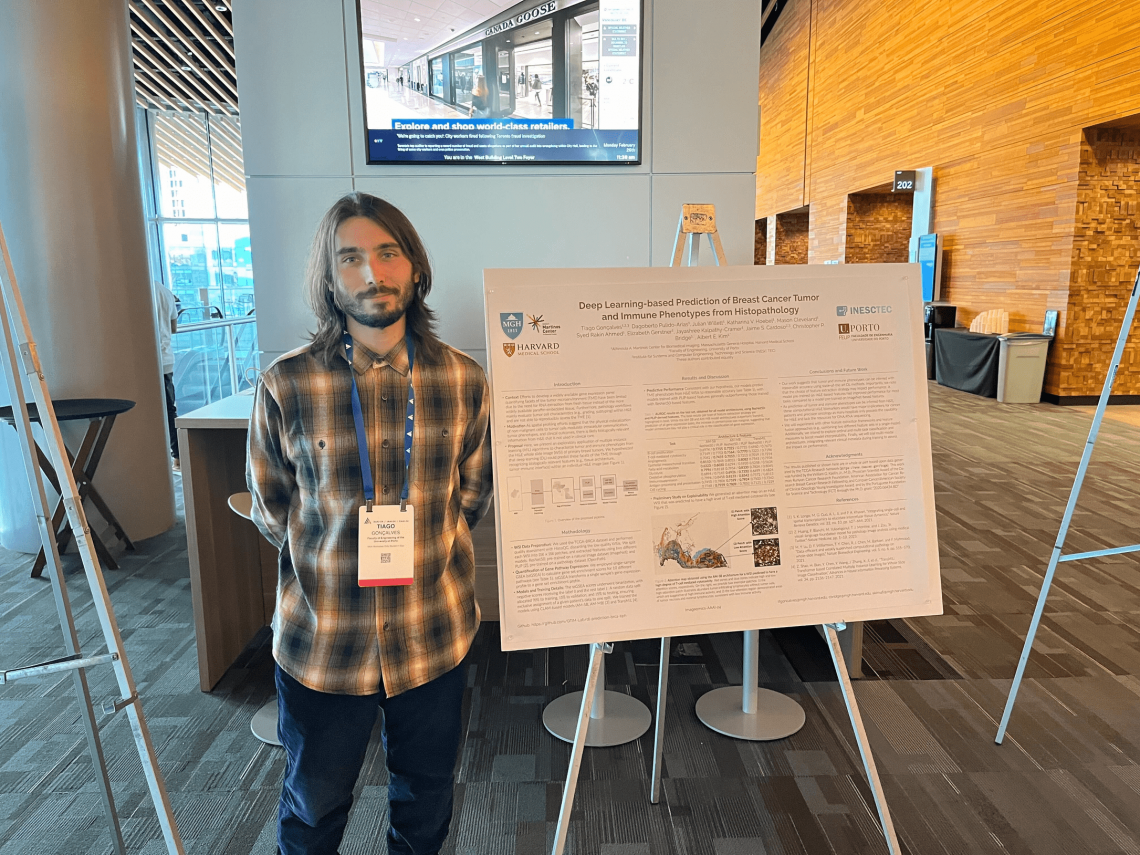Researchers from INESC TEC and the Athinoula A. Martinos Center for Biomedical Imaging – part of the Mass General Imaging (Massachusetts General Hospital, U.S.A.) – developed algorithms that can interpret the intricate patterns of microscopic images of breast tumours. The research, which could revolutionise cancer treatment through advanced imaging and Artificial Intelligence (AI) techniques, was presented at the AAAI’s 38th Annual Conference on Artificial Intelligence.
Predicting tumour behaviour with Artificial Intelligence
The core of this research lies in the application of AI to predict tumour behaviour and immune response from tissue samples. Taking advantage of the capabilities of cutting-edge imaging technologies, INESC TEC researchers Tiago Filipe Gonçalves and Jaime Cardoso, in collaboration with the Athinoula A. Martinos Center for Biomedical Imaging, developed sophisticated algorithms that can interpret the patterns of microscopic images of breast tumours. This innovative approach makes it possible to accurately predict the aggressiveness of a tumour and the effectiveness of the body’s immune response against it.
The study uses advanced AI techniques to analyse histopathological images – high-resolution pictures of tissue samples. By training algorithms on vast datasets of said images, the researchers enabled AI to identify subtle, often imperceptible features that correlate with tumour behaviour and the ability of the patient’s immune system to fight it. This level of accuracy was previously unattainable through conventional methods.
From microscopes to algorithms: the future of cancer diagnosis
The implications of these findings are significant and far-reaching. With the ability to accurately predict tumour behaviour and immune response, oncologists may soon be equipped with powerful tools to adapt treatments to each patient’s unique cancer elements. This personalised approach promises to increase the effectiveness of therapies, minimise unnecessary treatments, and significantly improve patient outcomes.
“Traditionally, breast cancer treatment has relied heavily on generalised protocols, which do not consider individual tumour variability. The introduction of AI-based diagnostics marks a shift towards more personalised medicine. By understanding the specific dynamics of each tumour, healthcare professionals can design more targeted and potentially more successful treatment plans”, explained Tiago Filipe Gonçalves, researcher at INESC TEC.

This study also enables new research opportunities on the mechanisms of cancer and the immune response. The ability to decode complex interactions in tumour microenvironments may lead to the discovery of new targets and therapeutic strategies. In addition, it underlines the importance of interdisciplinary collaboration in scientific advances, bringing together knowledge from computer science, oncology and biomedical imaging.
The presentation of these results at the AAAI’s prestigious annual conference highlights the significant role of AI in modern healthcare. As AI continues to evolve, its integration into medical research and clinical practice is expected to increase, heralding a new era of innovation in cancer care and beyond.
The researchers mentioned in this news piece are associated with INESC TEC and UP-FEUP.


 News, current topics, curiosities and so much more about INESC TEC and its community!
News, current topics, curiosities and so much more about INESC TEC and its community!